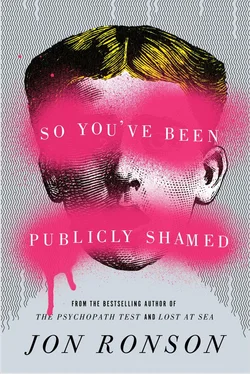Thirteen.Raquel in a Post-Shaming World
A little boy and his father were eating breakfast at an almost deserted restaurant in the Meatpacking District of Manhattan when they became aware of a man dashing across the floor toward them. He seemed to have something urgent to say. The boy looked anxious at what might happen next. The stranger took a breath.
“STUDY HARD AT MATH!” he yelled.
There was a silence. “Okay,” the boy said.
At this, the man walked over to me and sat down, pleased to have had the chance to positively motivate a child. His phone rang. “Sorry,” he mouthed. He picked it up. “DID YOU DO TEN STRONG POWERFULS LAST NIGHT?” he hollered at the receiver. “WORD OF HONOR? GOOD FOR YOU! LOVE YOU, BYE!” He put the phone down. Then he smiled, delighted that this was proving to be such a gold-rush morning for him in terms of imparting inspirational messages.
—
His name was Jim McGreevey. He used to be the governor of New Jersey. He’d been a severe one too: “I never pardoned anyone,” he told me.
“How does the pardoning process even work?” I asked him.
“The attorney general’s office makes a recommendation,” he replied. “They contact the local county prosecutor, who contacts the parole officer of the person being considered for a pardon, who makes an official recommendation to the governor. Who was me.”
I pictured the prisoners in their cells, concentrating hard on their letters to Jim, frantically wondering how best to lay out their mitigating circumstances. What would draw Jim in? What would grab the attention of the governor?
“Can you remember any of their stories?” I asked Jim.
“I never read any of them,” he said.
“You never even looked ?”
Jim shook his head.
“You were like a hanging judge,” I said.
“I was a law-and-order Democrat,” Jim said.
• • •
Bill and Hillary Clinton had campaigned for Jim back in 2001. He was young, handsome, and married, with two beautiful daughters. He won a landslide victory and took his place at the heart of the New Jersey power elite—“as close,” as he’d later describe the state in his memoirs, “to Machiavelli’s cutthroat Venetian principality as anywhere on Earth.” It was a place where “political meetings start with a big bear hug” so that each hugger could surreptitiously check the other for a concealed wire: “A New Jersey pat down among friends.” Now Jim had a beach house, a helicopter, a staff of cooks, and Drumthwacket, the governor’s mansion.

Drumthwacket
Jim considered himself awesome. He was inviolable. This was just after 9/11. He’d turn up at places like the offices of the Bergen Record —North Jersey’s regional newspaper — and hold forth, lording over the journalists, making grand pronouncements like “We will not skimp on security. We’ve even employed a security adviser from the Israeli Defense Forces, probably the best in the world.” Then he’d swan off, thinking how well it had gone, unaware that the editorial board of the Bergen Record was now wondering why on earth the governor of New Jersey had employed a man from the Israeli Defense Forces to advise on local security.
• • •
When Jim was a young boy, he’d lie in his tent at summer camp and “think I was hearing people in other tents call me a faggot and then realize that they were.” Jim stirred his coffee. “It’s funny how these things just stay.”
“They really stay,” I said. “My life at fifteen and sixteen never leaves me.”
We looked at each other then — Jim and I — two middle-aged men in a coffee shop in New York City.
—
Jim grew up, went to Columbia University, and would some nights walk all the way down from 116th Street to the Meatpacking District to look into the windows of the gay bars. But he couldn’t bring himself to go inside and he’d walk back up to 116th Street.
He grew up to become an assistant prosecutor—“a prosecutor’s prosecutor”—and a town mayor. He read books on how to stop having gay thoughts. As a state assemblyman, he voted against gay marriage.
He lost his first election campaign for the governorship by just twenty-seven thousand votes (out of more than two million votes cast). When he was campaigning for the second time, he went on a diplomatic junket to Israel where he found himself at a lunch in some rural town. The man sitting next to him introduced himself. His name was Golan, he said, and he worked for the local mayor.
“I followed your campaign very closely,” Golan told Jim. “Twenty-seven thousand votes is a very narrow margin.”
Jim was, he’d later write, “flattered beyond anything I’d ever experienced before. Nobody commits to memory the demographic standings of a politician halfway around the world.”
Jim fell in love with Golan. He told him that if he came to New Jersey he’d give him an important concocted job title like “special counselor to the governor.” Golan agreed and, on his arrival in America, demanded an especially opulent office that had already been allocated to another member of Jim’s staff. Jim gave Golan the office.
• • •
A few weeks after Jim’s visit to the Bergen Record , the newspaper published a profile of the unexpected Israeli staff member, referring to Golan as a “sailor” (he had once been in the Israeli navy) and a “poet” (he’d written a collection of poems in high school). Jim feared they might be using code words, but he didn’t know for sure and he couldn’t talk to anyone about it. His staff was acting like nothing was different, but that didn’t mean nothing was different.
“People don’t say things to governors that they don’t think governors want to hear,” he told me.
—
Jim distanced himself from Golan. He told him he needed to quit his job for the good of the administration. Golan was devastated. He had envisaged a great career in U.S. politics and now Jim was throwing him on the fire to save his own career.
A few weeks later, a letter arrived for Jim. It was from Golan’s lawyer. Golan was threatening to sue Jim for sexual assault and harassment.
“When I got that letter, I had this vision of my grandmother’s china cabinet,” Jim told me. “And all the china was just smashing.”
—
After three years in power, it was over for Jim. He called a press conference. “I am a gay American,” he announced.
He confessed the affair, resigned the governorship, stepped off the stage, checked himself into the Meadows, an Arizona clinic, and was diagnosed with posttraumatic stress disorder.
• • •
You met James Gilligan?” Jim said to me in the restaurant. “Oh, I love Gilligan. I love Gilligan.”
In fact, I had met James Gilligan at the very beginning of my journey — a few days after Jonah Lehrer had made his disastrous apology speech at the Knight Foundation lunch. Gilligan is in late middle age now, with the worried face and wispy hair and wire-rimmed glasses of the East Coast psychiatrist he is. I sat with him in the communal courtyard of his apartment in New York City’s West Village. He’s about the world’s best-informed chronicler of what a shaming can do to our inner lives, which is why he’s so opposed to its renaissance on social media. I wanted to learn how he came to make it his life’s work.
—
Back in the 1970s, Gilligan told me, he was a young psychiatrist at Harvard Medical School. His days were spent “treating middle-class neurotics like you and me.” He was completely uninterested in the strange epidemic that was occurring within Massachusetts’s prisons and mental hospitals “of suicides and homicides and riots and hostage taking and fire setting and everything you can imagine that was dangerous. Prisoners were getting killed, officers were getting killed, visitors were getting killed. It was completely out of control during the entire decade of the 1970s. There was a murder a month in one prison alone, and a suicide every six weeks.”
Читать дальше













